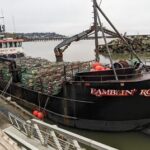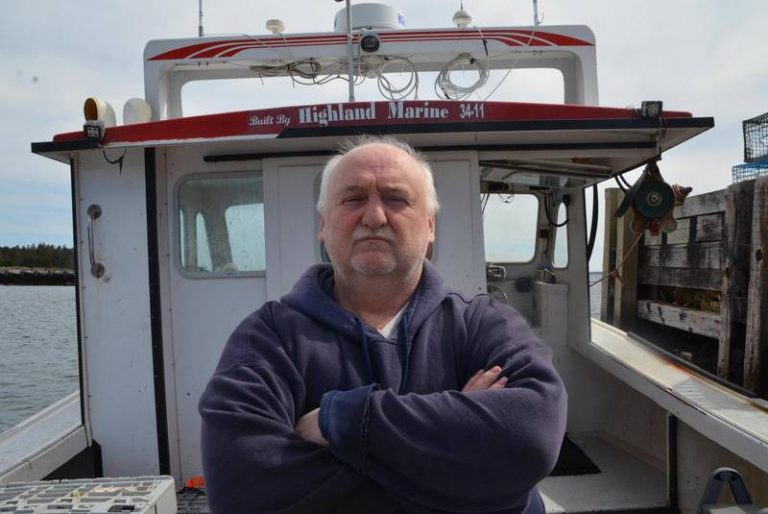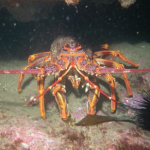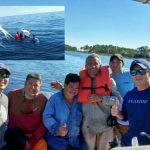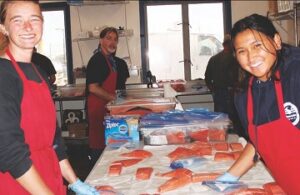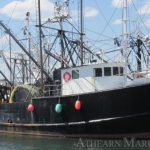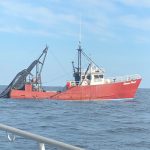Tag Archives: Andrea Hance
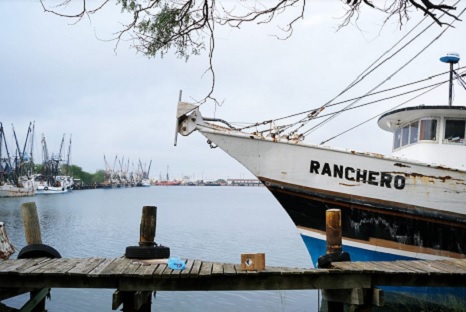
Texas: Shrimping grinds to a halt as import oversupplies add to ongoing woes
The Gulf shrimping industry, including the Brownsville-Port Isabel fleet, shrinking steadily over the last couple of decades, is now in a state of near total collapse thanks to new, unprecedented challenges in addition to the usual. So says Andrea Hance, executive director of the Texas Shrimp Association, who said she and her husband have put their two shrimp boats up for sale because it’s become impossible to make money fishing for domestic shrimp anymore. About 95% of the local fleet is tied up, most fleet owners are cutting their crews loose, and just about everybody Hance knows is trying to sell their boats and shrimping licenses, she said. >click to read< 19:09
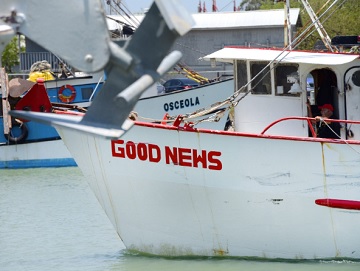
Shrimping industry facing historic challenges
Andrea Hance, executive director of the Texas Shrimp Association, headquartered at the Port of Brownsville, said in April that the high cost of fuel was preventing a lot of boats from going out. The price of fuel has fallen in recent weeks, though in a case of unfortunate timing some owners filled up before prices starting dropping, she said. With a typical fuel tank capacity of 15,000 to 20,000 gallons, 10 or 15 cents either way makes a big difference, said Hance, who owns two shrimp boats with her husband, Preston. One of the boats is in dock for repairs and the other was filled up at $4.40 a gallon of diesel — before it started coming down, she said. >click to read< 10:04
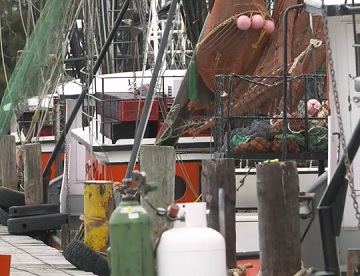
High fuel prices have Texas shrimping industry at virtual standstill
The price of diesel is so high right now that many Texas shrimpers are struggling, not making money, fearing that they’ll lose their crews if they’re docked much longer. “The majority of the vessels in the gulf, I would imagine they’re either tied up at the dock right now or they’re headed back to the dock, because they’ve run out of the cheap fuel,” said Andrea Hance, executive director of the Texas Shrimp Association. “And it [fuel prices] jumps around every day. If you do the math on that, that comes out anywhere from $60,000 to $100,000 just to fill up one of these boats for maybe a 60-day trip. We will not be able to make money on that.” Video, >click to read< 09:13
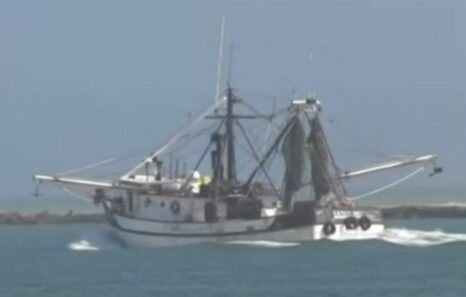
Low fuel prices may have saved Gulf Coast shrimpers
Texas shrimpers had a painfully low amount of shrimp harvested in the Gulf in 2020. It dropped from an annual average of 45-50 million pounds of shrimp to 38 million pounds. Yet in the beginning stages of a new year, there is interesting news about what actually happened. According to Andrea Hance with the Texas Shrimp Association, “We actually ended the year on a fairy positive note and it’s kind of hard to believe,,, video, >click to read< 16:48
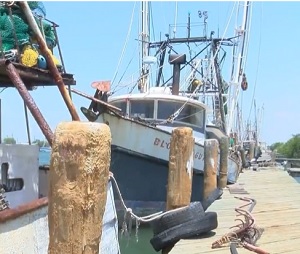
Brownsville: How Coronavirus pandemic is affecting shrimp producers
About two months ago, one of Andrea Hance’s boats came in with about 10,000 pounds of shrimp. Hance said on average the price of shrimp that they get from the boat is about $5, but buyers were not willing to pay that much. “They were coming back after they told us that they were not going to bid at all, you pressure them a little bit and then they said well we’ll give you a bid, but you’re not going to like it,” said Hance. “Well we ended up selling our shrimp for $3 a pound so we lost quite a bit of money on the last trip.” These are prices that John Keil Burnell, who is one of the owners of Shrimp Outlet in Brownsville, is seeing. Video, >click to read< 16:16
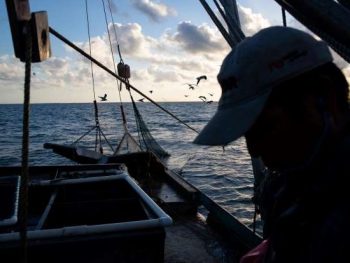
South Texas shrimpers cling to culture as industry undergoes change
Doan Pham leaves Rockport Harbor just after after 6 a.m. aboard his 40-foot shrimp boat named Margie.,, From a small cabin at the front of the boat, Pham reaches out to other bay shrimpers by radio.,, This is how Pham, one of the few remaining bay shrimpers in Texas, has started almost every morning for the last 41 years. The number of shrimp boats operating in Texas has drastically decreased since the late 1980s. That’s also when sales of farm-raised shrimp imported into the U.S. from other countries began to take off. >click to read< 12:28
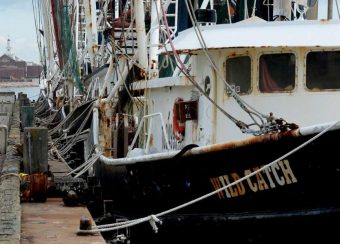
Southeast Texas shrimpers struggle with slow season
Shrimp boats along the Southeast Texas coastline remain docked as their owners try to navigate an industry whose hardships haven’t stopped since Tropical Storm Harvey entered the Gulf of Mexico a little more than a year ago. With federal regulations curbing production and unfavorable sea conditions hampering shrimp populations, Port Arthur and Sabine Pass shrimpers are hoping for the best after a season of loss. Peak shrimping season, from mid-July to October, is closing out this year with about 20 to 25 percent less production than last year, Texas Shrimp Association executive director Andrea Hance said. >click to read<18:38
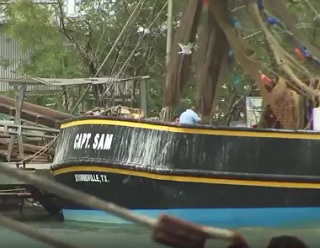
Shrimpers Still Impacted by Shortage of Workers
Shrimpers in the Rio Grande Valley say they are still experiencing a shortage of workers. Captain Jesus Moreno tells CHANNEL 5 NEWS it’s a tough job. He explains, new shrimpers quit within days and ask to go home. This year, the number of visas issued under the H2B program expanded. Still, only about 15 to 20 percent of the shrimpers received a visa worker. KRGV’s Christian von Preysing spoke with Andrea Hance with the Texas Shrimp Association. She says Texas shrimpers need a total of 750 workers. >click to watch<15:02
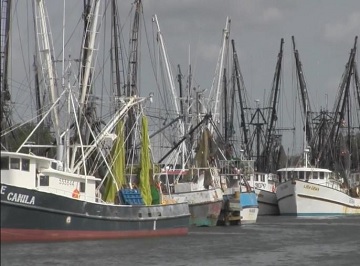
Texas Shrimp Industry Lacks Willing U.S. Workers
It’s two weeks in the Shrimp Season and Texas shrimpers are dealing with another worker shortage. Last year about 20% of the Texas Shrimp fleet stayed in Port from a lack of workers. Andrea Hance is Executive Director of the Texas Shrimp Association based in Brownsville. She told The Texas Standard that about 8 to 10 percent of the state’s shrimp boats are still tied up at docks. “And those boat owners or captains what happened to them is they don’t have enough people to even man the boat, um, so they may only have one other person, well, the boat needs at least three to go out and efficiently operate.” >click to read<11:48
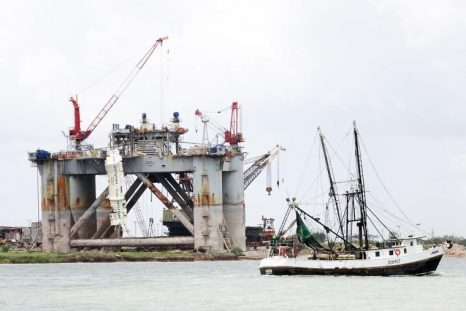
Shorthanded – Shrimp industry fears worker shortage
The Texas shrimp industry is celebrating a handful of recent legislative wins while also dreading next year’s shrimp season if changes aren’t made to the seasonal foreign worker visa program.
The Brownsville-Port Isabel shrimp fleet starts this season, which opens today, without enough workers. Andrea Hance, executive director of the Texas Shrimp Association, estimates that 70 percent of the fleet’s 140 trawlers will head out to the Gulf shorthanded. >click to read<10:51
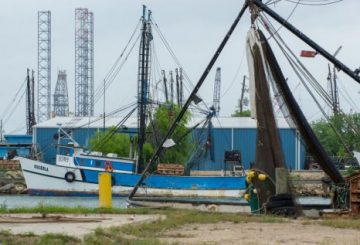
SIMP: Federal monitoring program will track foreign imports
A decision by Congress to add imported shrimp to the Seafood Import Monitoring Program is good news for an industry not used to hearing good news. The Gulf shrimp industry has struggled against a rising tide of cheap foreign imports for years, making it tough for domestic shrimp boat operators to make a living. Combined with the factors, this situation has led to a dramatic decline in the size of the Brownsville-Port Isabel shrimp fleet.,, The purpose is to thwart illegal, unreported and unregulated fishing activity. >click to read<10:38
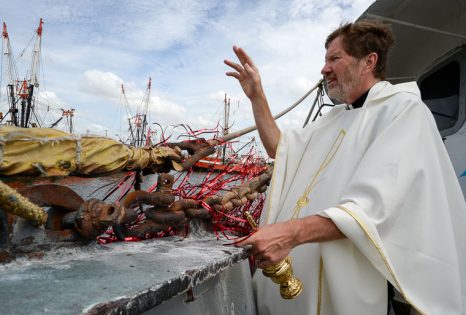
Brownsville: Shrimp season starts with shrimp boats lacking workers
The Texas shrimp industry faces an especially daunting challenge this year, a reality echoed in the fierceness of Father Mark Watters’ blessing-of-the-fleet sermon Monday at the Brownsville Shrimp Basin. It was Watters’ 12th year blessing the Brownsville-Port Isabel shrimp fleet, though it’s doubtful he has ever raised the roof like he did Monday with a 25-minute pep talk that started quietly before building to a shouting crescendo, Watters promising the few dozen assembled that “Jesus is in the mountain-moving business.” He didn’t mince words when citing the difficulties the fleet faces this year, namely, a dire shortage of workers from Mexico. The industry is fighting a misperception that it would rather hire Mexican H-2B visa workers than U.S. workers because they’re cheaper, Hance said, though the truth is that finding Americans to crew shrimp boats is practically impossible despite the industry’s best efforts. click here to read the story 12:58
Shortage of Workers Expected to Affect Upcoming Gulf Shrimp Season
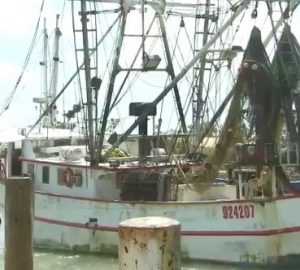 Boat owners said new restrictions on work permits for foreign workers are forcing them to count on whichever workers they can find. Boat owner Marcelino Ochoa said his employees at the shrimp basin are currently getting their boats ready for their time out on the Gulf. Crew member Carlos Martinez, 66, said he’s been a shrimper for about 25 years. He said he has no plans to retire anytime soon. “We’re already used to doing this type of work. So, we do it with pride because we like it,” he said. Ochoa said he’s been struggling to find workers willing to spend months on the water doing tough labor. He said younger generations are just not interested in these types of jobs. Ochoa added he was lucky to get what he could, young or old, to fill positions on his 13 boats. click here to read the story 12:52
Boat owners said new restrictions on work permits for foreign workers are forcing them to count on whichever workers they can find. Boat owner Marcelino Ochoa said his employees at the shrimp basin are currently getting their boats ready for their time out on the Gulf. Crew member Carlos Martinez, 66, said he’s been a shrimper for about 25 years. He said he has no plans to retire anytime soon. “We’re already used to doing this type of work. So, we do it with pride because we like it,” he said. Ochoa said he’s been struggling to find workers willing to spend months on the water doing tough labor. He said younger generations are just not interested in these types of jobs. Ochoa added he was lucky to get what he could, young or old, to fill positions on his 13 boats. click here to read the story 12:52
Texas Shrimp Association industry director steamed over Deepwater Horizon Restore Act money
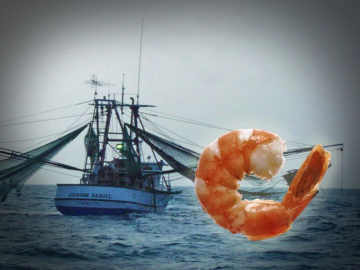 Andrea Hance isn’t happy. The executive director of the Texas Shrimp Association said that of the billions of dollars in RESTORE Act money — fines related to the Deepwater Horizon oil disaster in 2010 — that have been distributed to various groups in Gulf states, her industry received nothing for marketing and promotion, even though Texas shrimpers were significantly affected by the worst oil spill in U.S. history. It may all come down to the fact that, historically, the state’s industry has never had much of a voice, thus few people outside the industry understand it. But that doesn’t make Hance, who took the helm at TSA three years ago, feel any better about it. People assume that because the oil, which gushed from the seafloor for 87 days roughly 42 miles from the Louisiana coast, didn’t stray into Texas waters that the state’s shrimpers weren’t affected. In fact, when state and federal waters off Texas are closed to shrimping each year from mid-May to mid-July, the state’s fleet depends on the waters off Louisiana. Read the rest here 10:01
Andrea Hance isn’t happy. The executive director of the Texas Shrimp Association said that of the billions of dollars in RESTORE Act money — fines related to the Deepwater Horizon oil disaster in 2010 — that have been distributed to various groups in Gulf states, her industry received nothing for marketing and promotion, even though Texas shrimpers were significantly affected by the worst oil spill in U.S. history. It may all come down to the fact that, historically, the state’s industry has never had much of a voice, thus few people outside the industry understand it. But that doesn’t make Hance, who took the helm at TSA three years ago, feel any better about it. People assume that because the oil, which gushed from the seafloor for 87 days roughly 42 miles from the Louisiana coast, didn’t stray into Texas waters that the state’s shrimpers weren’t affected. In fact, when state and federal waters off Texas are closed to shrimping each year from mid-May to mid-July, the state’s fleet depends on the waters off Louisiana. Read the rest here 10:01

































